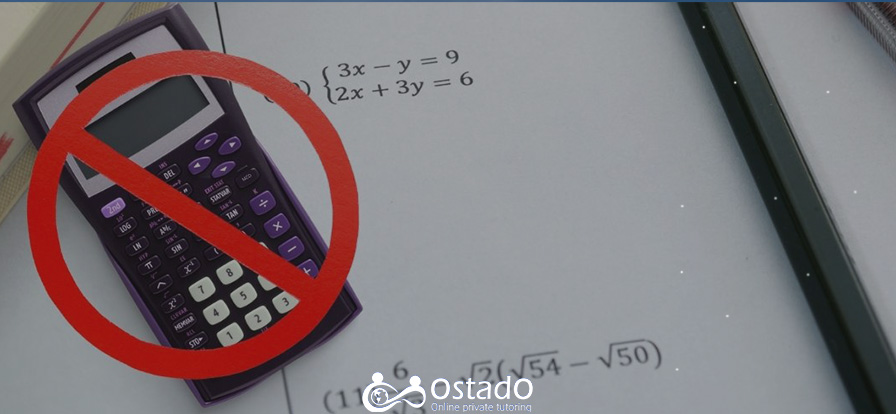We all know that maths is not a walk in the park, and like it or not, it’s one of the compulsory GCSE subjects too, which means that you must pass the exam. Even if you fail, you must keep retaking until you turn 18. What’s excruciating is that you can’t use a calculator for all GCSE maths papers.
The exam consists of three papers. The first paper is designed to test your ability to solve maths problems and perform calculations without the help of a calculator. But with these GCSE maths non-calculator revision tips, you don’t need to worry about the GCSE maths exam.
Understanding the Non-Calculator Paper
The non-calculator paper consists of 20 to 30 questions, and the test-takers have 75 to 90 minutes to answer them. The non-calculator paper questions cover different categories, including algebra, geometry, arithmetic, and statistics. Students can get up to 80 marks by answering the question on this paper, which is 33.3% of the total GCSE maths score.
Non Calculator Maths Questions
There are various question types in the paper with different marks. You can find short questions with a single mark and long questions with more marks. The marks of a question usually indicate how many steps there are to follow in order to answer a question.
For example, a question with three marks means that you should take three steps to solve the problem. Overall, the question type, number of questions, and complexity depend on the exam board that holds the exam. Below, you can find GCSE maths non calculator example questions.
If you’re looking for revision guidelines for maths exam papers that allow the use of a calculator, click on “GCSE Maths Calculator Revision”
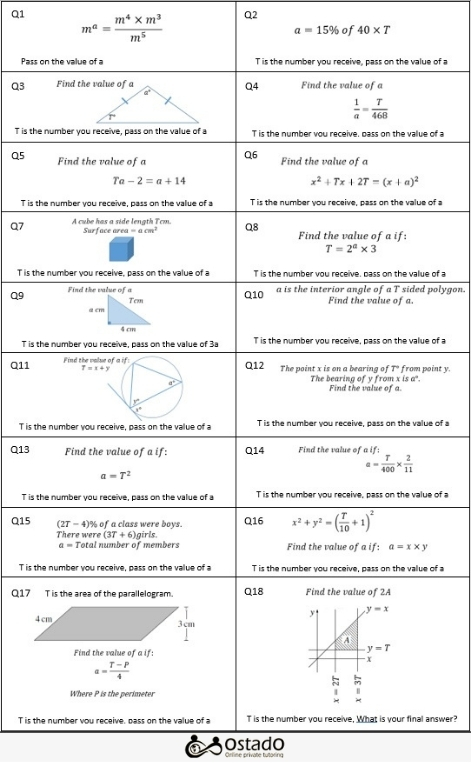
Click to download the Word file of GCSE maths non-calculator example questions.
Exam Papers: What to Expect
The content of the exam papers varies among exam boards and even within an exam board’s different sittings. The first questions in the exam are usually easy, and as the applicants proceed, the questions become more complex. Moreover, the non-calculator paper covers a wide range of mathematical topics, as shown in the graph below.
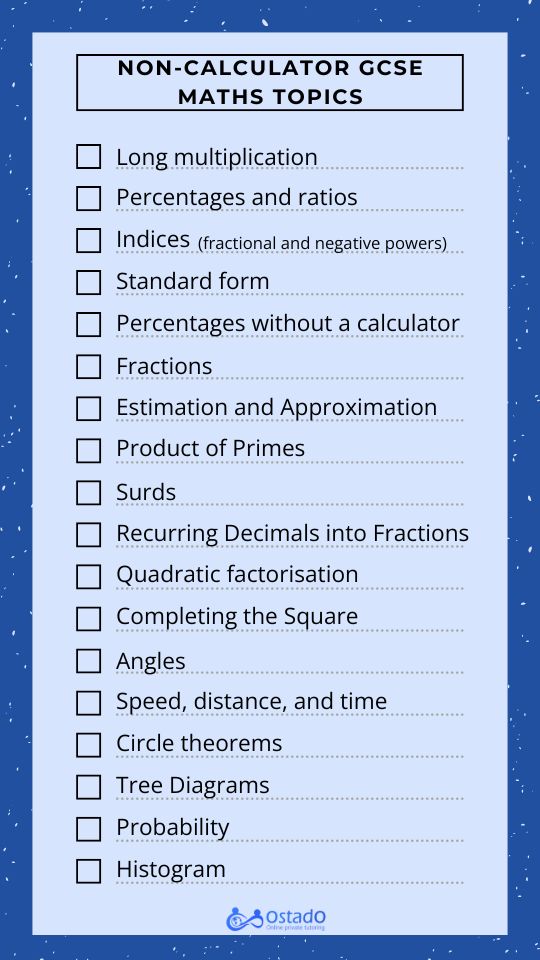
Click here for an exhaustive checklist of GCSE maths topics.
Revision Strategies for Non-Calculator GCSE Maths Papers
Acing the GCSE maths exam does not have to be so difficult. By observing some points, you can maximise your productivity in the GCSE maths exam sitting. Let us review some of these tips here.
1. Practise Mental Arithmetic
mental mathematics refers to mathematical operations and calculations you do without using a calculator. Instead of reaching out for your cellphone to use the calculator, try to use your brain. Your brain is a muscle, and too much technology (like too much junk food) makes it slow.
Start with simple operations (i.e., addition, subtraction, multiplication, and division) and with high numbers, try to estimate the answer before you find the exact value. You can also play games like Sudoku or KenKen to practise mental maths, and you can set time limits to make it more challenging.
2. Learn Key Formulas
By learning the recurrent formulas in the GCSE maths exam, you can answer the questions and solve the problems more quickly. This will give you a better grasp of your time when taking the exam. You can see some of these formulas below.
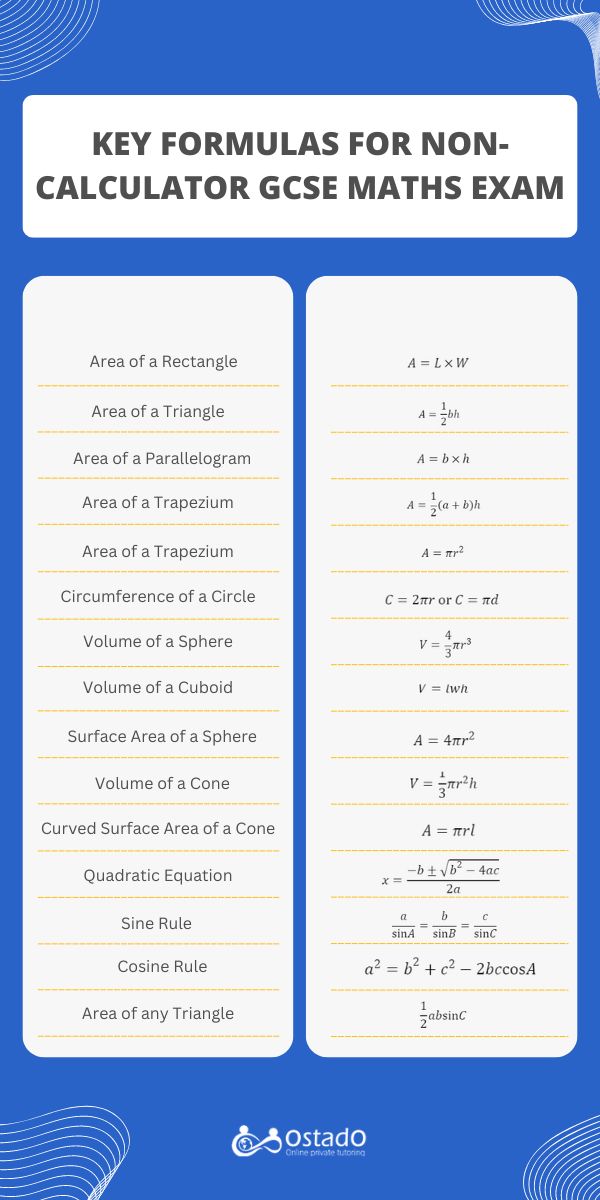
3. Use Various GCSE Revision Resources
Practice papers and quizzes are great resources for familiarising yourself with the structure, question types, complexity level, grading scheme, etc. They can also help you identify the gaps in your mathematical knowledge.
To get the most out of practice tests, you should time yourself when you take them. Time restraints simulate the exam conditions, and you would get a sense of your performance under pressure. On the whole, practising past papers boosts your confidence and significantly improves your marks. Click to download past GCSE maths papers.
Revision mats designed for the non-calculator paper are also helpful materials for GCSE applicants. Revision mats contain information about different topics in the GCSE maths exam, and you can use them to understand a mathematical topic at one glance. Click to download maths revision mats.
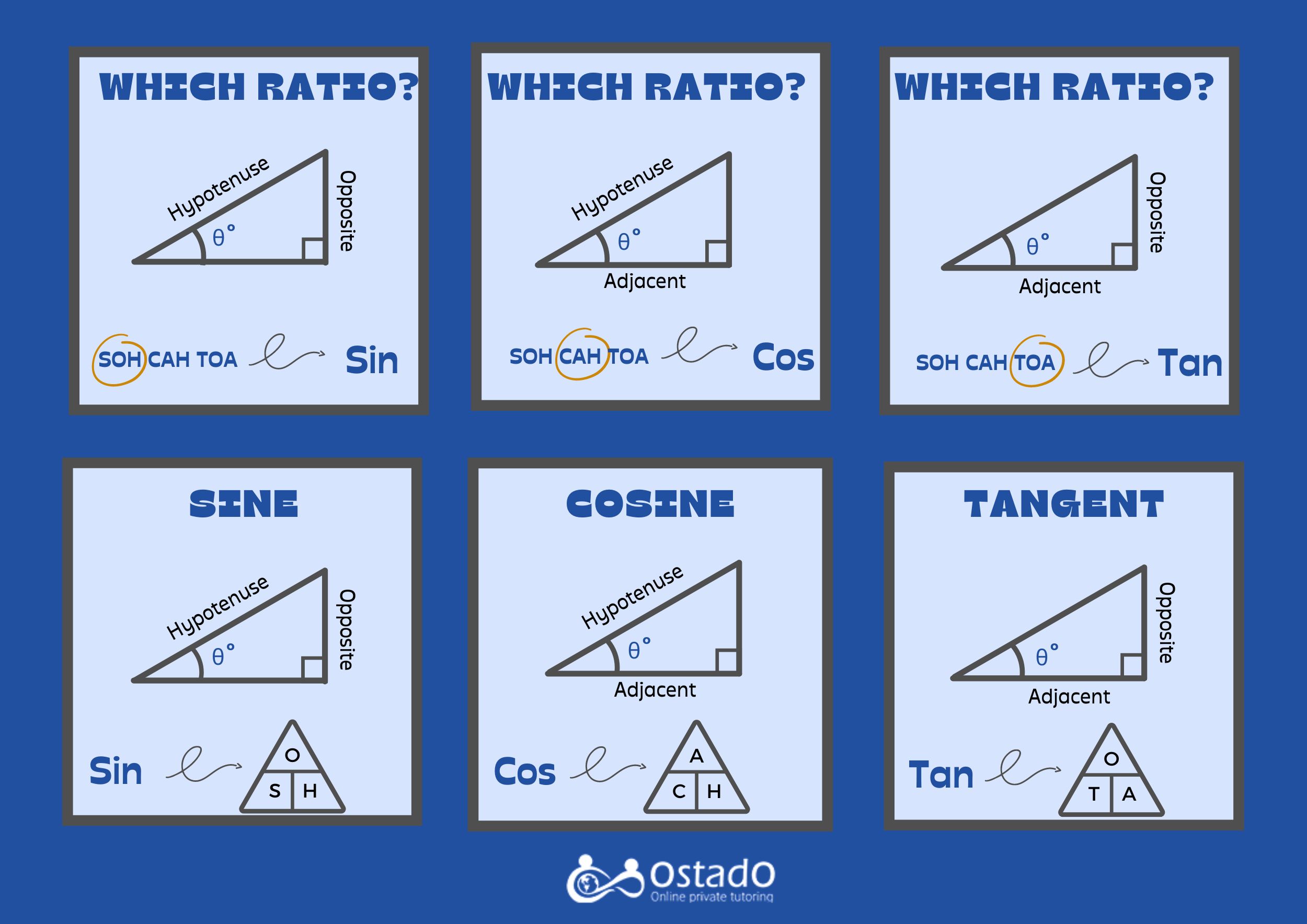
4. Start Early
Hasty preparation for the GCSE maths exam is not very effective. Applicants must start preparing for the exam six months before the exam date, which is in May or June. An early start takes the pressure off you and promotes concentration.
Otherwise, you’ll have to cram the revision in the few weeks leading up to the exam day. We strongly advise you against this. However, if, for any reason, your revision plan didn’t go as expected, here are a few tips to help you with Last Minute GCSE Maths Revision.
5. Get Help From Maths Tutors
Getting help from a tutor is a paid privilege, but it’s the most effective way to fill your mathematical knowledge gap. A tutor’s job is to turn your weaknesses into strengths; that’s exactly what you need to ace the maths exam.
Additionally, a tutor can give you personalised lessons and feedback that might change everything; maybe you’ve been revising inefficiently the whole time.
Ostado’s handpicked tutors can offer everything you expect from a private tutor. The service is online and available 24/7 to fit every schedule. Our maths tutors have intensive knowledge of GCSE maths, which helps them find what’s your real problem in understanding maths and address it immediately.
By the way, the first session is free. So, just book a trial session, evaluate the quality of Ostado’s tutors for yourself, and see if it’s worth it. Click to book your first online private maths class with a GCSE maths tutor.
6. Design a Practical Study Plan
You are the master of your time, and no one knows better how much of it you can find in your daily life and dedicate to studying. The important thing here is to be realistic when planning your GCSE exam preparation.
You are aware of your resources and capabilities. With some discipline, you will unleash your potential. Find out whether you are a lark or a night owl and do the bulk of your studies accordingly.
7. Budget Your Time
Take another look at the above checklist of the topics covered in the non-calculator GCSE maths papers. Which ones are simpler, and which ones need more time? You should prioritise more complex GCSE maths non calculator topics and dedicate more time to them. Dedicate more time to topics that are more challenging for you. Also, as mentioned earlier, you should do it within the hours when you are at your best.
You can download our GCSE revision timetable template for free to plan and organise your maths revision. You can also use these templates to keep track of your progress to know where you are and whether you need to modify your pace. Additionally, they give you a satisfactory feeling and motivate you to keep up the excellent work.
8. Aim for Productivity
The time you spend revising for GCSE maths won’t yield the expected results unless you make the best of it. Some students may think that they should force themselves to sit down for an hour or so and practice maths to get good grades. While it may work out, it’s not the best way.
Instead, you can use the Pomodoro technique to break long study sessions into shorter, more efficient sessions. Based on this technique, you should focus only on maths for 25 minutes, and then you can let your mind wander around for five minutes and then repeat the cycle. Watch this short video to learn more about the Pomodoro technique.
Interesting fact:
According to the Brain Drain Hypothesis, your smartphone can distract you even if it’s turned off. To get rid of distractions from your smartphone, you should put it on the do not disturb mode and place it somewhere so it’s no longer in your sight.
Final Preparations for GCSE Maths Non Calculator Paper
The GCSE qualification is not an overnight success. It requires meticulous planning, hard work, and guidance from an education expert or GCSE maths tutor. Revising for GCSE non-calculator maths paper must be finished two or three weeks before the exam.
In the remaining period, you should practise past papers to test yourself. This allows you to identify your weaknesses and work on them. In other words, you should not add new things to your schedule in the few weeks left to the exam session.
It is also essential to establish a regular sleeping habit with at least seven hours of sleep in 24 hours. Try to eat healthy and nutritious food, especially in the days before the exam. Recognise and respect your efforts to gain confidence and stay calm.
FAQs - GCSE maths non-calculator revision
- Which exam board is the hardest for GCSE maths?All exam boards are regulated by Ofqual, and they are required to start with easy questions and move towards more complex questions. The difference between exam boards lies in the question style and grading scheme. Generally, whether to consider an exam board as "the hardest" depends on what kind of questions the applicant wants to answer.
- How much GCSE revision per day?The important thing in revising for GCSE is the quality of revision. The time depends on your personal life. But you need to spend at least two hours on weekdays and four to six hours on weekends and holidays to revise for the GCSE maths.
- What is the most important thing to learn for GCSE maths?The most important thing is a thorough understanding of the concepts covered in the GCSE maths exam in different areas like Algebra, Geometry, Probability, etc.

